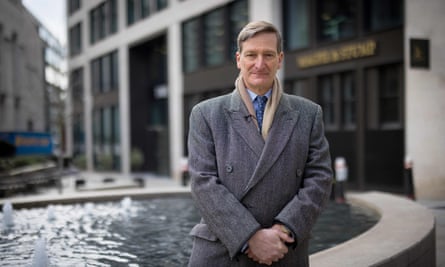Ministers failed to act on advice to tighten security laws that could have prevented an alleged Chinese spy from targeting Prince Andrew, a former attorney general has said.
Dominic Grieve, a former Tory MP who chaired the Intelligence and Security Committee (ISC) until 2019, said ministers were advised five years ago to introduce laws to criminalise foreign agents, but failed to do so. Similar laws already exist in the US and Australia.
“We remain without an important weapon in our armoury,” Grieve said. “We asked for [this law] in the context of the Russia inquiry report” – which accused the government of failing to investigate Russian interference in British politics – “and in my view we badly need it. This reinforces the need to do it.”
On 13 December, court papers revealed that a businessman accused of being a Chinese spy had become “a close confidant” of the Duke of York, Prince Andrew. It emerged that Andrew had invited the man to Buckingham Palace.

In 2019, the ISC recommended ministers make it a criminal offence to act as an agent of a foreign power without disclosing that fact. If parliament had adopted the new law, foreign agents could be arrested.
“If you are operating in the US and masquerading as a businessman but in fact you are on the payroll of the Chinese state and you don’t divulge that, then you can prosecute that person for being an undisclosed agent of a foreign power,” Grieve told the Observer.
In February 2023, a man, referred to in court papers as H6, was prevented from flying from Beijing to London and, in March 2023, Suella Braverman, the then home secretary, barred him from the UK because his presence was not conducive to the public good.
H6 appealed to the Special Immigration Appeals Commission which rejected his claim last week. The judgment found that H6 had “attempted to conceal or downplay” his links to the United Front Work Department, which gathers intelligence for the Chinese Communist party.
A 2023 ISC report said that Chinese intelligence services had been collecting vast amounts of information and targeting people in every level of politics and public life, particularly those it saw as being more susceptible because they had lost power or influence.
Prince Andrew stepped back from his royal duties in November 2019 after a public backlash when he attempted to defend his friendship with the paedophile Jeffery Epstein in a BBC Newsnight interview. His only income now is reportedly a £20,000-a-year Royal Navy pension.
This makes him vulnerable to such approaches, according to the author Andrew Lownie, who is writing a biography about Andrew and his ex-wife, Sarah Ferguson, Duchess of York.
“I fear several royals have been compromised by the Chinese,” Lownie said. “He’s not the only one.”
The Duke of York’s tangle with an alleged Chinese spy comes a month after Keir Starmer, the prime minister, said the UK needs a “strong UK-China relationship” after meeting Xi Jinping, the Chinese president, at the G20 summit.
Rachel Reeves, the chancellor, is due to visit Beijing in January for trade discussions, shortly before Donald Trump becomes US president for a second time and is likely to impose stringent tariffs on Chinese imports.
after newsletter promotion
Prince Andrew, 64, has faced accusations that he used his position and his publicly funded official trips abroad as a cover to make money from private business deals and to promote his Dragons’ Den-style Pitch@Palace project connecting fledgling businesses with investors.
When he was UK special representative for international trade and investment between 2001 and 2011, Andrew took the financier David Rowland, with whom he had a commercial relationship, on official trips and pitched the businessman’s services to high-ranking contacts.
The Sunday Times has reported the alleged Chinese spy had also met with former prime ministers David Cameron and Theresa May, on separate occasions.
Lownie said he has struggled to carry out the research for his new book, even though documents detailing who accompanied Andrew on official trips, for example, should be made available after 20 years under the Public Records Act.
He said: “For too long royal finances have been shrouded in secrecy. It is clear from the various scandals surrounding not just Andrew but other members of the royal family they cannot be trusted to police themselves.
“It is time the exemptions afforded them in the Freedom of Information Act be removed, that royal wills be made public and a register of royal interests be set up.
“We also need some sort of investigation into Andrew’s decade as special representative, his use of Pitch@Palace … and exactly how he has afforded his luxurious lifestyle over the last 20 years if trust in the monarchy is to continue.”
On Friday, Andrew said he had “ceased all contact” with the businessman when concerns were first raised about him. A statement from his office said Andrew met the individual through “official channels”, with “nothing of a sensitive nature ever discussed”.
Source: theguardian.com


